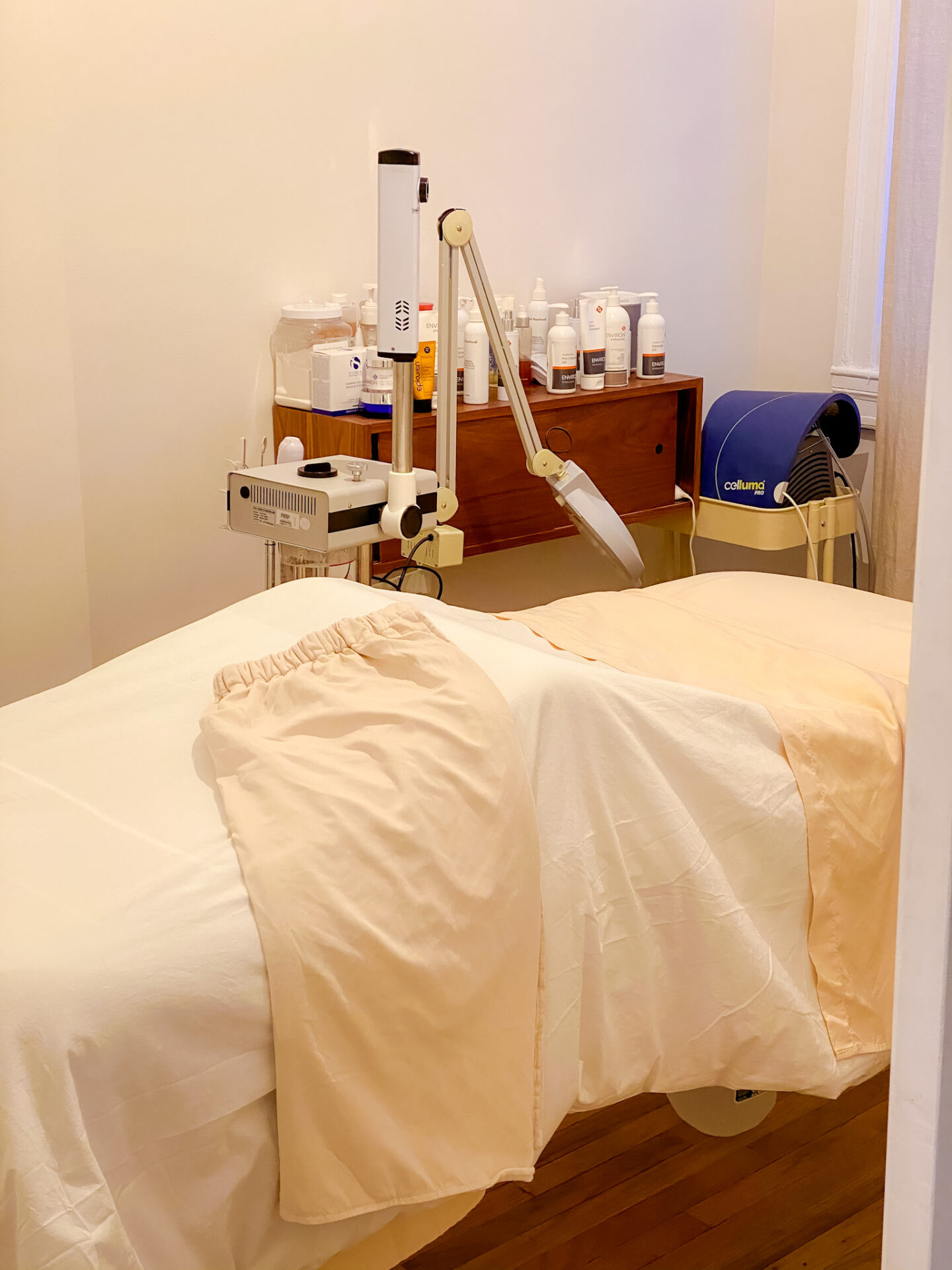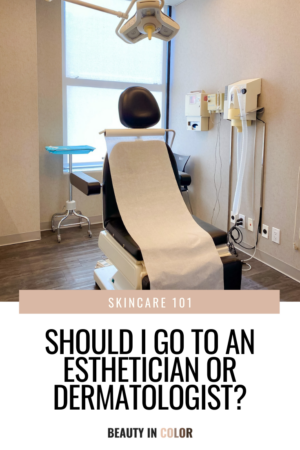Estimated reading time: 5 minutes
Both dermatologists and estheticians work on maintaining and enhancing skin health and beauty. Seeing either can help improve the quality of your skin.
If you’ve ever gotten a facial, you’ve probably seen an esthetician. And if you’ve ever gotten a skin cancer screening, you’ve seen a dermatologist.
But what exactly does each one do?
Do you know when to go to a dermatologist versus an esthetician? Most people don’t. So, I’m here to break it down.
Today, let’s talk about:
- The difference between a dermatologist and an esthetician
- What an esthetician does
- What a dermatologist does, and
- When you should visit each
So, what’s the difference between a dermatologist & an esthetician?
The most significant difference between a dermatologist and an esthetician is that a dermatologist can diagnose and treat skin diseases.
What does an esthetician do?

Estheticians are skincare specialists who can examine the condition of your skin and perform cosmetic treatments.
Although licensing requirements for estheticians vary from state to state, all states require estheticians to get formal training and pass a practical and written exam. In New York, you’re required to complete 600 hours of training.
And what does a dermatologist do?

A dermatologist is a medical doctor that can diagnose and treat conditions involving your skin, hair, and nails.
This includes treating eczema, psoriasis, and skin cancer and performing cosmetic procedures like botox and fillers.
Dermatologists are required to complete at least 12 years of school, including:
- A bachelor’s degree
- Four years of medical school
- A year-long internship
- Three years of residency
So, when would you go to a dermatologist instead of an esthetician?
A dermatologist is a doctor that’s medically trained to give you treatments for skin diseases. They can also prescribe topical creams and oral drugs.
I WOULD GO TO A DERMATOLOGIST FOR:
- Stubborn acne. If you’ve tried over-the-counter products and your acne is still conspicuous, you might need to make an appointment.
- Persistent skin irritation and rashes. Your skin irritation could be caused by an allergy, infection, or a skin condition, like eczema, rosacea, or psoriasis.
- A mole or patch of skin that’s changed. Melanoma affects more than 200,000 people a year. So, routine checkups are important. Get a skin cancer screening annually.
- Hair loss on your head, eyebrows, eyelashes, or any other areas of the body that previously had hair.
- Cosmetic procedures like botox, fillers, laser, professional strength chemical peels, and other injectables.
I WOULD GO TO AN ESTHETICIAN FOR:
- An analysis of my skin
- Advice on the best products for my skin
- A facial
- Light/moderate chemical peels
- Body Treatments
- Waxing
- Lash extensions
- Makeovers
An esthetician can refer you to a dermatologist and vice versa.
If an esthetician sees any skin abnormalities during a service, they’ll refer you to a dermatologist for an evaluation. Or suppose your esthetician thinks your acne can benefit from a prescription-strength treatment. Then, they’ll recommend you see a dermatologist.
A dermatologist may refer you to an esthetician if you’re more concerned with maintenance and prevention than a particular skin condition. And a dermatologist may suggest you see an esthetician for care in-between your dermatologist appointments.
Bottom Line
Dermatologists and estheticians are great for your skin health and work well together. But, they aren’t interchangeable.
#winedownwednesday with Dr. Michelle Henry

Get ready for another #winedownwednesday with me and NYC Board-Certified Dermatologist, Dr. Michele Henry, this Wednesday, January 27th, at 7:30pm EST.
Dr. Michelle Henry and I will be discussing:
- When you should see a dermatologist
- The stigma of cosmetic procedures in the black community, and
- When you should look at getting botox and fillers
We will, of course, be answering a few questions too. Make sure to submit them in the questions box in my IG stories, And bring a glass!
Have you been to an esthetician or dermatologist?

DID YOU LIKE THIS POST? PIN IT!



[…] for sensitive skin, thanks to its calming colloidal oatmeal, shea butter, and ceramides, which dermatologists recommend for people with eczema. This limited-edition set also includes a gentle […]
[…] and psoriasis, at first glance. If you’re not sure, I recommend going to a dermatologist to get a solid […]
[…] your eczema symptoms continue regardless of the products you use, talk to a dermatologist for further treatment. Eczema can be tricky to navigate, but keeping the skin […]